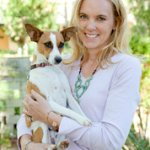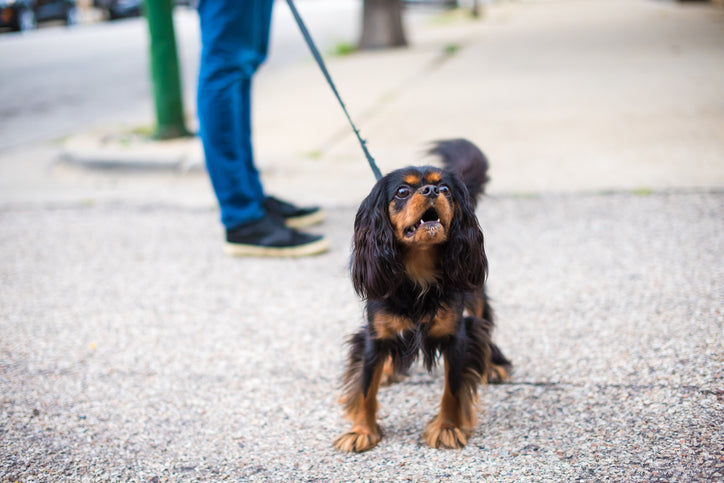If you have a dog that barks and lunges at other dogs and people, it can be very stressful.
After work, you want to take your dog on a relaxing walk to unwind but you end up more stressed than when you started! This is particularly perplexing for you if your dog is a sweet and loving angel at home with people and dogs that he or she loves.
I not only work with these dogs every day, I also have had dogs like this myself. Sometimes these dogs come from shelters or rescues with these behaviors, other times the puppy you have raised from 8 weeks turns into an adult dog that seems to be out of control. These behaviors often frustrate the people who love and care for these dogs. People will often try to punish the behavior or ignore the behavior, but often these techniques don’t work. If you have a dog that is reactive it is important to understand why they act the way they do.
When I work with reactive dogs I often look into 3 areas of the dog’s life. I will ask about genetics (what were the parents like- if this information is available), socialization (was the dog socialized as a puppy) and negative experience (was the dog traumatized or did they dog experience a fearful event).
Genetics
If you adopt your dog from a breeder or from a rescue that has one or both parents, it is important to meet them. If either of the parents show signs of fear, anxiety or aggression, there is a chance that your puppy will inherit some of those traits. It is possible to overcome some of the inherited behaviors, however, it can make training more challenging because you are going against genetics.
Socialization
If you adopt a young puppy it is critical that you begin safe socialization immediately. The more people, dogs, objects and places your puppy experiences before 16 weeks, the more likely you will have a resilient adult dog. The prime socialization period for puppies ends around 12 weeks of age. Between 16- 24 weeks, your puppy experiences his or her first “fear period”. During this period, if something scary happens, their brain may turn it into a “permanent fear” (which may take intense behavior modification to “undo”).
Many veterinarians will caution you to avoid taking your puppy out until after all of the vaccines are given (which usually occurs around 16 weeks). However, you can safely socialize your puppy by letting him or her play with well behaved, healthy puppies or dog, invite many people to meet your puppy (include all ages, men, women, beards, people with hats or sunglasses, etc.) and take your puppy to the homes of friends and relatives. If you have an indoor puppy class in your area (be sure that they clean the facility prior to puppy class), your puppy can meet more puppies and people while learning some basic behaviors.
Experiences
Make sure that you keep your puppy as safe as possible, especially during the first year. If your puppy or young dog is attacked at the park by another dog or is scared by a person (this sometimes happens inadvertently at the veterinary hospital), he or she can develop fears that are associated to the negative experience.
When I work with a family that has had the reactive dog since he or she was a puppy, we can often pinpoint the cause (or causes) of the reactivity. If the family adopted the dog when he or she was already an adult, we often cannot answer the questions why. However, by understanding that one or more of these things has led to the reactively, we can understand the underlying emotion that the dog is experiencing is fear. Once we can be more empathetic to the dog, we can help the dog by building his or her confidence, not by punishing or ignoring the cry for help.
 Shannon Coyner
Shannon Coyner
Shannon has been a pet lover all her life and a dog trainer for over 20 years. She has spent her life observing, caring for and training animals of all kinds. She has worked in the Bird Department at Marine World Africa USA, and worked as an handler and trainer for an African Serval Cat at Safari West, a private zoo in Santa Rosa, California. She has participated in behavior studies including observations of bald eagles and addax antelope through the San Francisco Zoo and Safari West.
Her education includes a Biology Degree, specializing in Zoology from Sonoma State. She is a Registered Veterinary Technician, a Certified Professional Dog Trainer (Knowledge Assessed), a Karen Pryor Academy Certified Training Partner, a member of the Association of Pet Dog Trainers and a member of the International Association of Animal Behavior Consultants.
Shannon is currently serving as President for the Society of Veterinary Behavior Technicians.
Shannon’s dog training philosophy revolves around force free, positive reinforcement, however, her ultimate goal is for healthy happy relationship between pets and their people. Diet, exercise, environment and training all play a significant role in achieving this goal.
Shannon is currently the owner of Ventura Pet Wellness and Dog Training Center in Ventura, CA where she works with anxious and fearful dogs privately as well as teaching agility classes (Venturapetwellness.com). Shannon has also started a training website called Truly Force Free Animal Training (trulyforcefree.com).




 Shannon Coyner
Shannon Coyner


